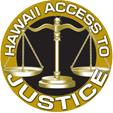Amendment of Class Action Rule An Important Funding Source
The Hawaii Access to Justice Commission, the Hawaii Justice Foundation, and the Hawaii Consortium of Legal Services Providers announced that they are working collaboratively to create awareness of an amendment to Rule 23 of the Hawaii Rules of Civil Procedure that could make significant funding available to support the work of nonprofit legal services providers. The amendment, adopted by the Hawaii Supreme Court effective July 1, 2011, provides direction to parties and the trial court regarding the distribution of residual funds in class action cases.
The amendment provides that there be a determination of the amount of funds that are payable to class members but will not be paid to them (such as where they cannot be located or do not submit required claim forms), and provides that there then must be an order for the payment of these residual funds. The amended rule states that it is within the discretion of the court to approve the timing and method of distribution of these residual funds, as agreed to by the parties, which may include distributions to nonprofit tax exempt organizations that provide legal services to indigent persons or to the Hawaii Justice Foundation (for distribution to one or more such organizations).
Cy pres
The amendment to Rule 23 operates in a manner similar the doctrine of “cy pres,” which means “as near as possible.” The cy pres doctrine was developed as a means of distributing a trust fund whose primary purpose could not be fulfilled, such as where the designated trust beneficiary was no longer in existence. “Distribution of residual funds to nonprofit organizations that are eligible to receive funding for the services they provide in helping individuals achieve access to the justice system serves a purpose that is very similar to the purpose served by the class action procedure—i.e., both enable individuals who could not otherwise do so to vindicate their legal rights,” says David J. Reber, member of the Administration
Committee of the Hawaii Access to Justice Commission who worked on the amendment proposal.
“Nonprofit organizations providing access to justice have been presented with financial challenges, with severely reduced state, city, federal, andprivatecontributions, while needs continue to grow for those they serve,” says Associate
Judge Daniel R. Foley, Chair,HawaiiAccess to Justice Commission. “Providing increased funding to support the efforts of these organizations will serve a compelling public purpose.”
This procedural rule would not override any provision of substantive law that would require a contrary disposition of the residual funds. The rule was designed to apply only in those cases in which the court approves or authorizes the creation of residual funds.
